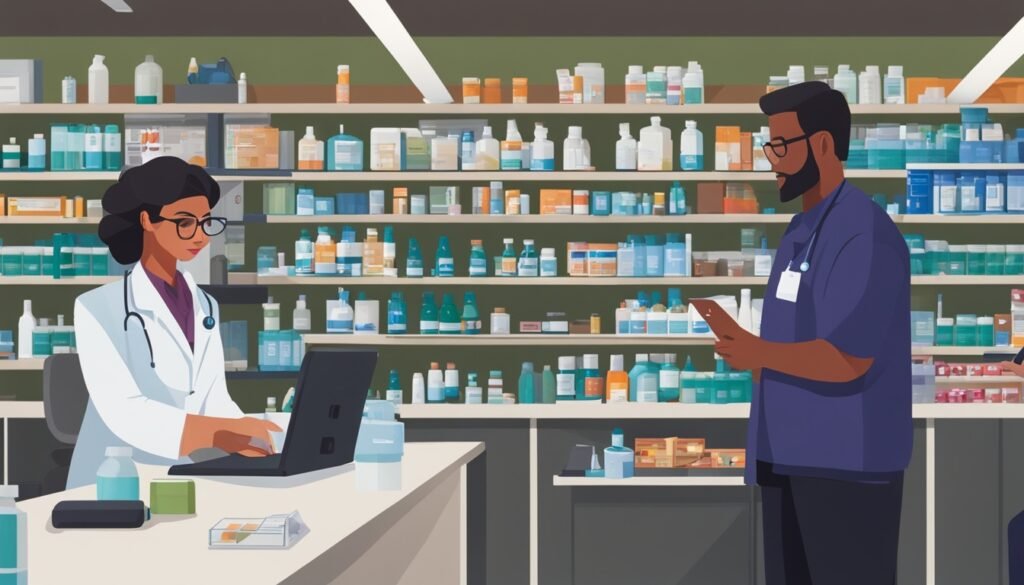In recent years, AI and robotics have made big strides in pharmacy. They’ve brought more technology into the field. This has made things more efficient and cut down on mistakes. But, there are worries about whether AI could replace pharmacists.
This article will look into how pharmacy is changing, what AI can and can’t do, and how pharmacists and AI can work together. This will help improve how we care for patients.
Key Takeaways
- The pharmacy profession is undergoing a technological transformation, with AI and robotics playing an increasingly significant role.
- Contrary to fears of job loss, the future of pharmacy promises an enriched scope of practice and the evolution of new career paths driven by technology.
- AI serves as a complementary tool to pharmacists, enhancing efficiency and reducing errors, rather than replacing human roles.
- Pharmacists must engage in lifelong learning to keep pace with technology advancements and evolving patient care needs.
- Regulatory compliance and ethical considerations are crucial as pharmacies integrate AI into their practices.
Introduction to AI in Healthcare
AI has changed many industries, including healthcare. Tools like chatbots and language models, like ChatGPT, can do complex tasks and give important info to doctors and patients. But, in healthcare, mistakes can be very serious. So, we must use AI carefully and wisely.
The Power of Artificial Intelligence
Adding AI to healthcare brings new ways to better patient care, make tasks easier, and help doctors make decisions. AI can do repetitive tasks, look at big data, and find patterns that are hard for humans to see. This could change many parts of healthcare, like how we manage medicines, diagnose diseases, and treat them.
Balancing Technology and Human Touch
AI in healthcare is promising, but we must balance tech with human care. Pharmacists have always been key in patient care, offering personal advice, help with medicines, and solving problems. As AI grows in healthcare, we must make sure it doesn’t replace the human touch. Instead, it should work with human skills.
More than three-quarters of people get shots at pharmacies, showing a big change in healthcare, especially during the pandemic. Pharmacists are now more focused on helping patients, showing the value of human skills and care over AI.
| Key AI Capabilities in Healthcare | Potential Applications |
|---|---|
| Automating Administrative Tasks | Scheduling appointments, handling billing, and cutting down on mistakes |
| Enhancing Clinical Decision-Making | Finding patients at risk, predicting if patients won’t take their medicine, and suggesting treatment |
| Improving Medication Management | Summarizing medical info, adjusting medicine amounts, and watching how patients react |
As AI grows in healthcare, we must make sure it’s used right. We should focus on making patients’ lives better and supporting healthcare workers, like pharmacists.
The Evolving Role of Pharmacists
Pharmacists have changed a lot, moving from just giving out medicine to focusing on patients. They now play a key role in healthcare, especially in rural and underserved areas. This change has made them a big part of the healthcare team, offering the same care as primary doctors.
The evolving pharmacy practice model is behind this change. Pharmacists use their knowledge to help with medication, chronic diseases, and preventive care. They work closely with doctors and other health workers, giving care that looks at the whole patient.
Pharmacists are now seen as mid-level providers, helping meet the need for more healthcare. In places with few doctors, they offer important services like screenings, shots, and managing medicines. This role has greatly improved health outcomes and the quality of care.
Retail pharmacies have also changed, becoming places for more healthcare services. Pharmacists work with patients to meet their health needs, help prevent health problems, and promote wellness.
Pharmacists are set to play an even bigger role in healthcare. They are using new technology and working with other health professionals. This makes them trusted partners in giving quality, personalized care to patients everywhere, including underserved communities.

“Pharmacists are no longer just dispensers of medication; they have become integral members of the healthcare team, providing comprehensive, patient-centric care that complements the work of physicians and other providers.”
Why AI Cannot Replace Pharmacists
AI has made big steps in healthcare, but it can’t take over the role of pharmacists. Pharmacists are key healthcare workers with a mix of clinical knowledge, empathy, and problem-solving skills that AI can’t match.
One big reason AI can’t replace pharmacists is the need for human interaction in patient care. Patients like the personal touch and guidance they get from pharmacists. Pharmacists are key in explaining medications, side effects, and why sticking to the treatment plan is important. This kind of care is hard for AI to copy because it lacks the human touch and emotional smarts.
Pharmacists are great at handling complex health situations, making smart choices, and meeting each patient’s needs. They use their deep knowledge of medicines and health issues to give advice and help. This approach is key to good health and avoiding problems with medicines.
| Key Reasons AI Cannot Replace Pharmacists | Importance of Human Pharmacists |
|---|---|
|
|
AI can do some tasks and help with making health decisions, but it can’t replace the human touch and skills pharmacists offer. As pharmacists’ roles change, they’ll be more important in patient-focused care. They’ll work with AI to make healthcare better and improve outcomes.
Limitations of AI in Pharmacy Practice
AI has the potential to change pharmacy work in big ways. But, it also has its limits. It can help with tasks like scheduling and billing. Yet, it’s not as good at making decisions about patient care.
Automating Administrative Tasks
AI can make pharmacy work more efficient. It can handle tasks like booking appointments and sending out refill reminders. This lets pharmacists focus more on caring for patients. It makes their work better and more productive.
Enhancing Clinical Decision-Making
But, AI is not as strong in making decisions about patient care. It can analyze data, but it might not have all the info needed for good decisions. Pharmacists must check AI advice carefully to keep patients safe.
AI in pharmacy shows we need to balance tech with human skills. Pharmacists are key in using AI insights wisely. They use their knowledge and focus on patients to give the best care.
| Limitation | Description | Impact |
|---|---|---|
| Lack of Access to Critical Information | AI may not have access to all the relevant patient data and clinical context required for informed decision-making. | AI recommendations may be incomplete or misguided, leading to potential patient safety risks. |
| Difficulty in Capturing Nuanced Clinical Judgment | The complex and nuanced decision-making process of pharmacists can be challenging for AI to fully replicate. | AI may struggle to make holistic, patient-specific recommendations that account for individual circumstances and clinical expertise. |
| Potential for Algorithmic Bias | AI systems can perpetuate biases present in the data used for training, leading to unfair or discriminatory outcomes. | AI-driven decisions may disproportionately impact certain patient populations, compromising the fairness and equity of healthcare delivery. |
As AI becomes more common in pharmacy, we must work on its limits. We want technology to help, not replace, the important work of pharmacists. They are key to giving care that focuses on each patient.
The Potential of AI in Pharmacy
Artificial Intelligence (AI) is changing the pharmacy world. It helps pharmacists give better care to patients. AI is great at finding patients at risk and predicting when they might not take their medicine.
AI looks at lots of data like patient histories and prescription info. It finds people likely to have bad reactions to drugs or not follow treatment plans. This lets pharmacists act fast to keep patients safe.
Identifying At-Risk Patients
AI systems check patient data for patterns that humans might miss. They spot drug interactions, complex health issues, and social factors affecting medicine use. This helps pharmacists focus on high-risk patients and care for them better.
Predicting Medication Non-Adherence
Not taking medicine as directed is a big problem in healthcare. It can lead to worse health outcomes and higher costs. AI can predict which patients might not follow their treatment plans. This lets pharmacists help these patients with education and tools to stay on track.
AI is very promising in pharmacy, but we must keep the human touch. Pharmacists need to check AI advice to make sure it’s right for each patient. By using AI wisely, we can make healthcare better, save money, and change pharmacy for the future.
| Potential of AI in Pharmacy | Description |
|---|---|
| Identifying At-Risk Patients | AI can analyze patient data to uncover patterns and insights that may not be easily discernible to human pharmacists, enabling them to proactively intervene and mitigate risks. |
| Predicting Medication Non-Adherence | AI can help predict which patients are more likely to miss doses, forget to refill prescriptions, or discontinue treatment prematurely, allowing pharmacists to implement targeted strategies to improve adherence. |
| Improving Patient Outcomes | By leveraging AI’s capabilities, pharmacists can provide more personalized and effective care, leading to better patient outcomes and reduced healthcare costs. |
Legal and Ethical Considerations
As AI becomes more common in healthcare, pharmacists and others face many legal and ethical concerns. A big worry is algorithmic bias in AI, which can mean unequal care. Pharmacists need to know how AI algorithms work to fix these biases.
Also, the chance of errors in using AI in healthcare is big. Relying only on AI could lead to bad outcomes. Getting patient consent for AI in their care is key.
Addressing Algorithmic Bias
AI models can show unfair and unequal healthcare if they’re biased. Pharmacists must watch how these models are trained and look out for biases based on race, gender, or socioeconomic status. Fixing these biases helps make AI decisions fair for everyone.
Mitigating Risks and Errors
Adding AI to pharmacy work also means there’s a risk of clinical errors that could harm patients. Pharmacists need to check AI advice and use their own judgment to reduce these risks. It’s important to have clear rules for using AI in healthcare to keep patients safe.
Looking out for patient privacy, being open, fighting bias, and making sure patients understand are key for a good future with AI in pharmacy. Working together is needed to set and keep these ethical standards.
| Key Legal and Ethical Considerations | Percentage of Participants Expressing Concern |
|---|---|
| Lack of legal regulation | 67.0% |
| Potential job displacement | 62.9% |
| Cybersecurity threats | 58.9% |
| Patient data privacy | 58.9% |
The Food and Drug Administration (FDA) has approved AI systems for healthcare use. This shows AI is now a part of healthcare. Pharmacists are leading the way in making AI work right in healthcare. Keeping patient info safe is a big part of this.
Being open about how AI makes decisions is key to trust and checking its work.

can ai replace pharmacists
AI is getting better in healthcare, making us wonder: Can AI replace pharmacists? AI can automate some tasks and make pharmacies more efficient. But, pharmacists’ skills and knowledge are key to caring for patients fully.
AI can’t match the personal care and problem-solving of pharmacists. Pharmacists know a lot about medicines and their effects. They give patients advice, watch their progress, and make sure medicines are used safely. These tasks need more than just knowledge; they need empathy and communication skills that AI doesn’t have yet.
Pharmacists are crucial in spotting and fixing medication problems like bad reactions or not taking medicine as directed. They use their knowledge and judgment to care for patients. AI can process lots of data and suggest things, but it can’t make the decisions that pharmacists do.
- Pharmacy automation, like robots, has been around since the 1990s, but it can’t replace pharmacists.
- AI tools can make things more efficient and cut down on mistakes, but they can’t match pharmacists’ skills and communication.
- Pharmacists are key for giving personalized care, advice on drug interactions, and keeping an eye on patient progress, especially with more older people and health issues.
Also, laws and rules for pharmacies, like checking prescriptions by eye, mean pharmacists must be involved. AI can help with paperwork, but only a human can make the final call on giving out medicines.
In the end, AI can help in pharmacies, but it can’t take over what pharmacists do. Pharmacists bring skills, knowledge, and a personal touch that’s vital for good healthcare. As AI becomes more common in pharmacies, we need to use both tech and people to get the best care for patients.
“Pharmacists are essential for medication management, advice on interactions, and monitoring patients’ progress, especially as the U.S. population ages and health declines.”
AI as a Complementary Tool
The healthcare world is changing fast, and AI’s role in pharmacy is getting more attention. Instead of seeing AI as a replacement for pharmacists, we should see it as a tool that helps them. AI can automate tasks and give insights, letting pharmacists focus more on patient care and use their unique skills.
Preserving the Human Touch
Pharmacists are key in healthcare, offering technical knowledge and personal care to patients. Keeping that personal connection and empathy is vital for good patient care. AI can do routine tasks like managing stock and giving out meds. But it can’t replace a pharmacist’s ability to talk with patients, understand their needs, and show compassion.
At the University of Florida’s College of Pharmacy, researchers are using AI to tackle big health issues. They’re working on new cancer drugs and fighting the opioid crisis. The University of California’s pharmacy program also teaches AI lessons, preparing students to use this technology well.
Adding AI to pharmacy work is an ongoing effort. It’s key to keep finding the right balance between tech and the human touch. By seeing AI as a tool, pharmacists can give better, more personal care. This leads to better patient outcomes and a better healthcare experience.

“AI can shift the focus in pharmacy from the dispensing of medications towards providing a broader range of patient care services by leveraging technology to identify drug-related problems, optimize patient care, increase collaboration, and provide guidance on healthcare options and lifestyle choices.”
Patient Consent and Transparency
As AI becomes more common in healthcare, we need clear rules for getting patient consent and being open. Patients must know the risks and benefits of AI in their care, just like in clinical trials. Pharmacists and healthcare workers should be open about using AI and help patients make smart choices about their health.
The World Health Organization (WHO) says we need careful checks and proof of benefits before using tools like ChatGPT and Bert widely in healthcare. The WHO stresses the need for ethical use of AI, protecting patient rights and making sure everyone is treated fairly.
How well AI works in pharmacy depends a lot on the data it’s trained on. Pharmacists should be clear about where this data comes from and the chance of bias. This could lead to wrong info or unfair treatment. Patients should know how AI is used in their care and agree to it before it starts.
“The integration of AI into healthcare necessitates new skills and training for healthcare professionals to understand how to use these technologies along with their limitations and ethical implications.”
It’s also key to be open about the money side of using AI in pharmacy. Generative AI might make pharmacists’ work easier and help patients stick to their meds better. But patients should know how this affects their care and the risks to their privacy and security.
Putting patient consent and openness first helps build trust with patients. It makes sure AI in pharmacy follows ethical rules and puts patients first.
Integrating AI into Pharmacy Practice
The healthcare world is changing fast, making AI a key part of pharmacy work. Pharmacists need to learn about AI through education and training. This helps them use AI well and give great care to patients.
Ongoing Education and Training
Learning about AI is crucial for pharmacists. Workshops, seminars, and online courses teach them about AI’s strengths and limits in healthcare. This knowledge lets pharmacists make smart choices and use AI right.
It’s also vital to keep up with AI news in healthcare. Pharmacists should take part in professional growth, read industry news, and talk with peers. This keeps them in the loop with the newest AI tools and best practices.
Adding AI to pharmacy work needs teamwork between pharmacists, healthcare groups, and tech companies. Together, they can make the most of AI’s benefits and ensure it’s used ethically. This teamwork helps bring the best care to patients.
| Key Statistics | Insight |
|---|---|
| 93% of pharmacists believe that integrating AI into pharmacy practice will positively impact medication management. | Pharmacists see AI as a big help in managing medicines better, from giving them out to watching over patients. |
| 80% of pharmacists predict that AI will optimize medication selection accuracy. | AI systems help pharmacists make better choices, cutting down on mistakes and making patients safer. |
| Over 70% of pharmacists see potential for AI to reduce medication dispensing errors significantly. | AI and automated systems make giving out medicines safer and less prone to errors. |
By embracing AI and keeping their skills sharp, pharmacists can lead the way in healthcare’s future. They’ll give care that’s more tailored, efficient, and effective.
Conclusion
The future of pharmacy practice is about mixing AI with human skills. AI can make tasks easier and more efficient. But, it can’t take the place of what pharmacists do best for patients.
Pharmacists should use AI wisely to make their work better and help patients more. The goal is to use technology without losing the personal care that patients need. As AI gets better, pharmacists will lead the way in making pharmacy better for everyone.
They will make sure that AI helps, not replaces, the care they give. This way, medicine management, patient care, and work processes will get better. But, it’s important to make sure AI helps pharmacists, not just take over.
In the end, the future of pharmacy is about working together with AI and human skills. This partnership will let pharmacists give patients better care. By using this approach, pharmacy can meet the challenges of AI and keep the personal touch in healthcare.
FAQ
Can AI replace pharmacists?
No, AI can’t take over the important job of pharmacists. Pharmacists have skills and expertise that AI doesn’t have. They provide care that’s personal and can’t be automated. AI helps with some tasks but can’t replace the human touch in healthcare.
What are the limitations of AI in pharmacy practice?
AI can do some tasks and give insights from data, but it’s not good at making clinical decisions. It might not have all the info needed for good decisions. Pharmacists must check AI advice carefully to keep patients safe.
How can AI be utilized to enhance the capabilities of pharmacists?
AI can spot patients at risk and predict when people might not take their medicine. It can also summarize info to help with decisions. This lets pharmacists spend more time on patient care and use their unique skills.
What legal and ethical considerations are involved in the use of AI in pharmacy?
Using AI in healthcare brings up legal and ethical issues. These include bias in algorithms, errors, and the need for patient consent. Pharmacists must know how AI works and ensure it’s used fairly and with patient knowledge.
How can pharmacists effectively integrate AI into their practice?
Pharmacists need to learn about AI to use it well. They should get training to keep up with new tech and rules. This way, they can use AI to improve patient care without losing their human touch.
